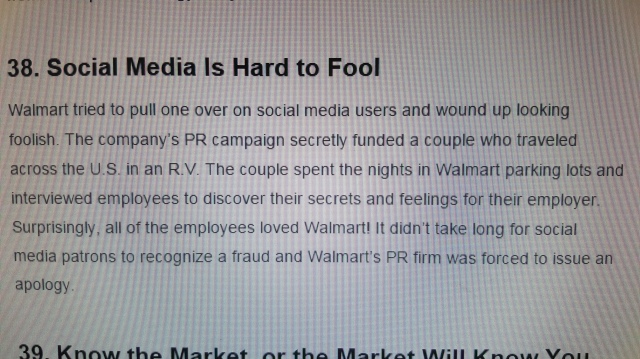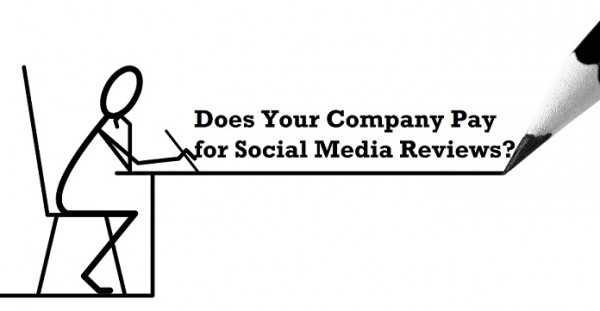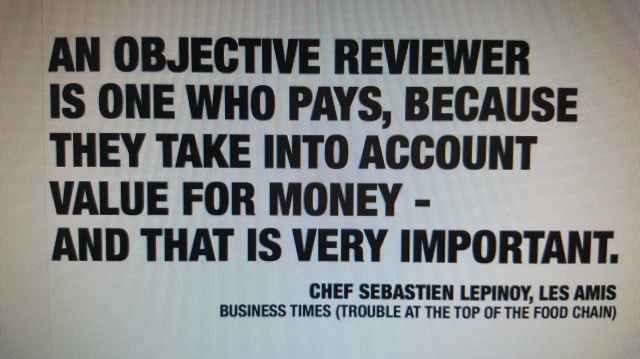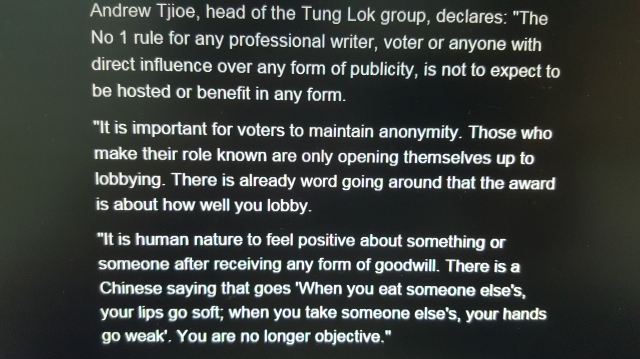In Singapore’s fiercely competitive F&B industry, the constant flow of publicity is crucial for restaurants to stay on the radar of indecisive diners.
Social media was the obvious “go to”, anyone with a smartphone is now constantly barraged with Instagram posts of food and blogger reviews.

Sadly, filtering the legitimacy of one from another is nearly impossible! Hosted meals are usually not mentioned or in fine print at the end of the review.
From the business perspective, paying a food blogger to write a good review is certainly a very effective way to boost traffic and publicity. However, from the consumer stand point, do you feel cheated? We believe in the food blogger’s reviews because we trust their judgement and that these are unbiased opinions from ordinary customers like us. However, is that really the case? Are the food bloggers really objective in their reviews in consideration of being paid?
Lets go in the context of Singapore’s top food bloggers,
According to The Business Times, a F&B operator paid “ladyironchef-Brad Lau” a fee of S$3,800 to promote its restaurant via food reviews. Brad Lau with over 640,000 followers on Instagram alone is perhaps the best known food blogger.
Seth Lui with over 13,000 followers on Instagram charges from S$1,000 to S$10,000 for advertorials.
After knowing the fact that relatively most of the reviews are paid or hosted by restaurants, it surely strikes a question in our minds, is it realistically possible to stay objective if one is being hosted to a free meal? or worst, being paid a 4 digit sum to do it?
Furthermore,
This is an example of an unhappy customer who followed the recommendations of a food blogger.
Now to the question of being ethical. After reading through this post, do you feel that restaurants are ethical in playing the “trust” card via paid or hosted food blogger’s reviews?
I personally feel that it is normal and acceptable for a business to have paid food reviews as a form of advertorial on social media platforms, however it should be clearly stated in the post that its a sponsored or paid review! The omission of that fact is clearly unethical to me as a consumer.
For businesses thinking of indulging in unethical methods to boost sales, keep this in mind!

(392 words)
References:
Trouble at the top of the food chain. (n.d.). Retrieved November 9, 2015.
http://www.businesstimes.com.sg/lifestyle/food-drink/trouble-at-the-top-of-the-food-chain-0
A PR Case Study: Wal-Marting Across America. (n.d.). Retrieved November 9, 2015.
http://www.newsgeneration.com/2014/04/04/pr-case-study-walmarting-across-america/
The dark, ugly side of social media marketing. (n.d.). Retrieved November 9, 2015.
http://www.rappler.com/move-ph/ispeak/71632-social-media-marketing-dark-ugly-side
Bloggers On The Menu. (n.d.). Retrieved November 9, 2015.
http://six-six.com/article/bloggers-on-the-menu
(n.d.). Retrieved November 9, 2015.
Click to access ibe_briefing_22_the_ethical_challenges_of_social_media.pdf
Image credited to: http://marketingland.com/wp-content/ml-loads/2012/09/paid-social-media-reviews-600×311.jpg
Image credited to: https://instagram.com/infatuation/
Useful Links:
https://blog.kissmetrics.com/social-media-can-destroy/
http://prrt.co/sa/1?url=http://www.ladyironchef.com/
https://instagram.com/ladyironchef/?hl=en







Hi Clinton! There has been an escalation in the numbers of bloggers in recent years, probably due to the high advertorial fees and fame. Similar to you, I too think that it is acceptable for bloggers to do a paid advertorial for the company, provided they explicitly state that it is a paid review. Paid reviews are often not the true appraisals of the bloggers. Since they are paid to do a review, they are expected to only write positive things! Things will only get ugly when reader’s expectations are not met, especially when they have absolute trust in the blogger’s review, just like the case of Rozz. I definitely am not in the favour of companies paying bloggers writing a review, I’ll be extremely disappointed if someone were to raise my expectation, only to experience bad tasting food! ☺
LikeLiked by 1 person
Pingback: Review on Topic 4: Social Media Ethics | Luna Pang
Hey Clinton,
I like the way you use food bloggers’ reviews to talk about the ethical issue of paid advertising. Gluttons like me would definitely read their reviews time to time, and before deciding to dine at a particular café or restaurant.
But, after reading your post, I feel so cheated. Hence, it think it is NOT ethical to use paid reviews through social influencers, to earn our trust. Just like what the fashion bloggers are doing now, it will be right if only they state that it’s a sponsored ad.
However, on the other hand, a paid review will definitely be positive, since it won’t be right for them to write negative things. Hence, my question to you is, will you still trust a sponsored advertisement? For me, I would say not really.
These are just what I feel, share with me what you think too!
LikeLiked by 1 person
Hi there TianYi,
Thanks for your positive review! Glad that it aided you in your understanding of the topic.
To answer your question, I personally still will read and take into notice a sponsored advertisement. However, the degree and extend in which I trust it varies. Once it has been brought to my attention that a review is sponsored, I will naturally look at it at a different perspective. For example, I may automatically tone down the benefits and advantages of the particular product or restaurant as it probably is exaggerated.
At the end of the day, an advertisement is an advertisement, its all up to our own personal cognitive ability to decipher and process the underlying truth from it.
This is an article from the business times that you may find useful, it provides some pointers that i did not cover on why you shouldn’t trust online reviews.
LikeLiked by 1 person
Pingback: In a Nutshell – Does ethics still exist in Marketing? | My Thoughts
Pingback: My REFLECTION on UNETHICAL ISSUES via SOCIAL MEDIA | junwai
Pingback: Reflection on Topic 4 + 2 Comments |
Hi Clinton!
Finally I can talk about food bloggers! It is interesting that you decided to post something in relation to how bloggers earn their money and reputation. As someone that always love food, I would usually search for reviews under Danielfooddiary, Ladyironchef and Miss Tam Chiak before suggesting it to my friends or going there. Reviews are definitely needed as we do not want to be disappointed by the food or ambience.
Even though I have heard about paid reviews or advertorials, I couldn’t believe that food bloggers are paid to write that post. I definitely felt cheated as we purely thought food bloggers tried the food themselves. It is definitely unethical for them to create a fake post and make us believe it. This makes viewers doubt their words as we do not know if they are doing it purely from their tongue’s palette or just for the sake of money.
However, there are definitely post that are really true to their words. It will definitely depends on our own decisions and beliefs to say if it is really good or not. Despite it being a paid advertorial or not, we will still go to their website to check it out right?
LikeLiked by 1 person
Hey Wanchyng!
Yea I totally agree with what you mentioned. I will certainly still check out the reviews even if it’s being sponsored or not. At the end of the day the decision lies within us, the firm can practice unethical practices but ultimately, the decision to believe or to follow lies with us.
We consumers should be responsible enough to be well educated in the fields of social media. We need to be aware of such issues out there so as to not be future “victims”.
One can only blame him or herself for falling prey to such practices!
Maybe what we can do in the future is to practice more cross referencing. This would definitely increases the validity of the information.
LikeLiked by 1 person
Hi Clinton,
I really enjoyed reading your blog! I like your structure and approach to this topic and you have brought your views regarding the ethical issue of paid reviews from food bloggers with the support of relevant information.
I agree with you that an objective reviewer is the one who pays because they take into account value for money. There is no reason to lie when there’s are no temptations or bribery involved.
I’ve also noticed in your blog you wrote that you personally felt that is was normal and acceptable for a business to have paid food reviews as long as the post states that it is sponsored or paid. However, it can be difficult to judge whether the review is sponsored or paid without the blogger or reviewer stating it, so how do you think customers like us can go about identifying these paid or sponsored reviews to avoid getting ‘cheated’?
LikeLiked by 1 person
Hope you’re doing great Yi Lin
Identifying sponsored reviews that are not clearly stated is a rather challenging task to achieve, hence it is deem unethical.
However, upon researching on this topic, I came across a article that could help us out with this problem.
We can identify traits in the reviews that may seem “fishy” :
1) A lot of superlatives and not much description. Phrases like “a must-read” and “life-changing” are giveaways.
2) References to other people such as “my family” or “my husband.” Keep in mind, if the person writing the review is making it up, the story tends to stray farther away from the actual product.
3) More frequent use of the first-person singular. Fictitious assessments tend to include the words “me” and “I” more often, as if to make the review seem more credible.
4) Exclamation points and positive emotion. Truthful reviews use other kinds of punctuation, including the dollar sign.
5) People who have written only one review on the site
6) People who write only five-star reviews
7) Reviews that sound like a marketing brochure from the company or use the full official name of the product.
I feel that these makes sense and I hope that it would help us into picking out those “fake” reviews!
Reference:
http://www.techlicious.com/tip/how-to-tell-if-a-review-is-fake/
LikeLike
Pingback: Topic 4 – Reflective Summary | ohwhyelle
Pingback: OH MY GAWD, ARE YOU SERIOUS? | What you want won't always come easy, but if you work hard and don't give up you will get there.
Pingback: Summary Reflection (What is beauty to you?) | It Never Ends
Pingback: Topic 4 – Reflective Summary & Comments | Living on the Web